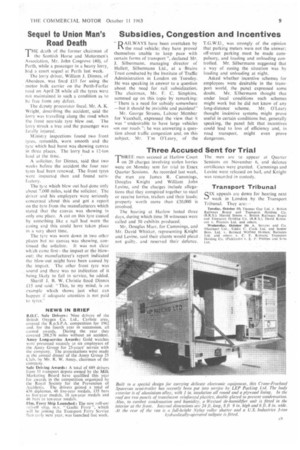Subsidies, Congestion and incentives
Page 11

If you've noticed an error in this article please click here to report it so we can fix it.
" AILWAYS have been overtaken by I. the road vehicle; they have proved themselves unable to keep pace with certain forms of transport", declared Mr. J. Silbermann, managing director of Hallett, Silbermann Ltd., at a .Brains Trust conducted by the Institute of Traffic Administration its London on Tuesday. He was speaking in answer to .a question about the need for rail subsidization. The chairman, Mr. F. C. Simpkins, summed up on this topic by remarking: " There is a need for subsidy somewhere —but it should be invisible and painless!"
Mr. George Strauss, Labour Member for Vauxhall, expressed the view, that it was " undesirable to have large vehicles -on our roads "; he was answering a question about traffic congestion and, on this subject, Mr. T:m O'Leary, of the T.G.W.U., was strongly of the opinion that parking meters were not the answer; off-street parking must be made compulsory, and loading and unloading controlled. Mr. Silbermann suggested that a way of casing the situation was by loading and unloading at night.
Asked whether incentive schemes for employees were desirable in the transport world, the panel expressed some doubt, Mr. SThermann thought that under local conditions such schemes might work but he did not know of any long-distance scheme. Mr. O'Leary thought incentive systems might prove useful in certain conditions but, generally speaking, the panel felt that incentives could lead to loss of efficiency and, in road transport, might even prove dangerous.




















































































































